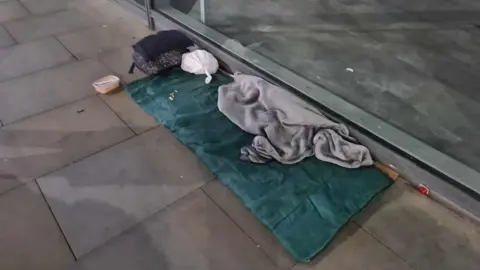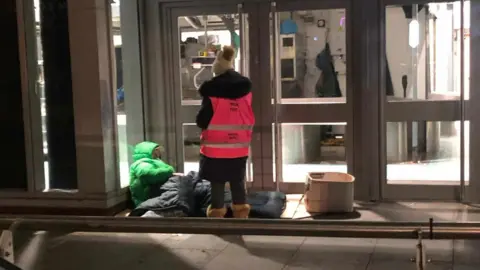Settlers set sights on Trump support for full control of West Bank
Religious Zionism’s Ohad Tal says activists already working to create ‘irreversible facts’ on ground; NGO official: ‘They’re not saying they’re annexing — they’re just doing it’
By Reuters and ToI Staff
Today,

File: A picture taken in the village of Turmus Ayya near Ramallah shows the nearby Israeli Shiloh settlement in the background, in the West Bank on February 18, 2024. (Jaafar ASHTIYEH / AFP)
After a record expansion of Israeli settlement activity, some settler advocates in the West Bank are looking to Donald Trump to fulfill a dream of imposing sovereignty over the area seen by Palestinians as the heart of a future state.
The West Bank has been transformed by the rapid growth of Jewish settlements since Prime Minister Benjamin Netanyahu returned at the head of a far-right nationalist coalition two years ago. During that time, an explosion in settler violence has also led to US sanctions.
In recent weeks, Israeli flags have sprouted on hilltops claimed by some settlers in the West Bank’s Jordan Valley, adding to worries among many local Palestinians of greater control of those areas. Some settlers prayed for Trump’s victory before the election.
Promoted: Sheba One Year Later, Dr Liran LevyKeep Watching
“We have high hopes. We’re even buoyant to a certain extent,” said Yisrael Medad, an activist and writer who supports Israel absorbing the West Bank, speaking to Reuters about Trump’s victory in the house he has lived in for more than four decades in the West Bank settlement of Shiloh.
Settlers have celebrated Trump’s nomination of a clutch of officials known for pro-Israel views, among them his intended ambassador, Mike Huckabee, an evangelical Christian who has said the West Bank is not under occupation and prefers the term “communities” to “settlements.”
Get The Times of Israel's Daily Editionby email and never miss our top stories
Newsletter email addressGet it
By signing up, you agree to the terms
And over the past month, Israeli government ministers and settler advocates who have cultivated ties with the US Christian right have increasingly pushed the once fringe idea of “restoring sovereignty” over the West Bank — effectively annexation — in public comments. The Netanyahu government has not announced any official decision on the matter. A spokesperson at Netanyahu’s office declined to comment for this story.

File: A picture taken in the village of Turmus Ayya near Ramallah shows the nearby Israeli Shiloh settlement in the background, in the West Bank on February 18, 2024. (Jaafar ASHTIYEH / AFP)
After a record expansion of Israeli settlement activity, some settler advocates in the West Bank are looking to Donald Trump to fulfill a dream of imposing sovereignty over the area seen by Palestinians as the heart of a future state.
The West Bank has been transformed by the rapid growth of Jewish settlements since Prime Minister Benjamin Netanyahu returned at the head of a far-right nationalist coalition two years ago. During that time, an explosion in settler violence has also led to US sanctions.
In recent weeks, Israeli flags have sprouted on hilltops claimed by some settlers in the West Bank’s Jordan Valley, adding to worries among many local Palestinians of greater control of those areas. Some settlers prayed for Trump’s victory before the election.
Promoted: Sheba One Year Later, Dr Liran LevyKeep Watching
“We have high hopes. We’re even buoyant to a certain extent,” said Yisrael Medad, an activist and writer who supports Israel absorbing the West Bank, speaking to Reuters about Trump’s victory in the house he has lived in for more than four decades in the West Bank settlement of Shiloh.
Settlers have celebrated Trump’s nomination of a clutch of officials known for pro-Israel views, among them his intended ambassador, Mike Huckabee, an evangelical Christian who has said the West Bank is not under occupation and prefers the term “communities” to “settlements.”
Get The Times of Israel's Daily Editionby email and never miss our top stories
Newsletter email addressGet it
By signing up, you agree to the terms
And over the past month, Israeli government ministers and settler advocates who have cultivated ties with the US Christian right have increasingly pushed the once fringe idea of “restoring sovereignty” over the West Bank — effectively annexation — in public comments. The Netanyahu government has not announced any official decision on the matter. A spokesperson at Netanyahu’s office declined to comment for this story.
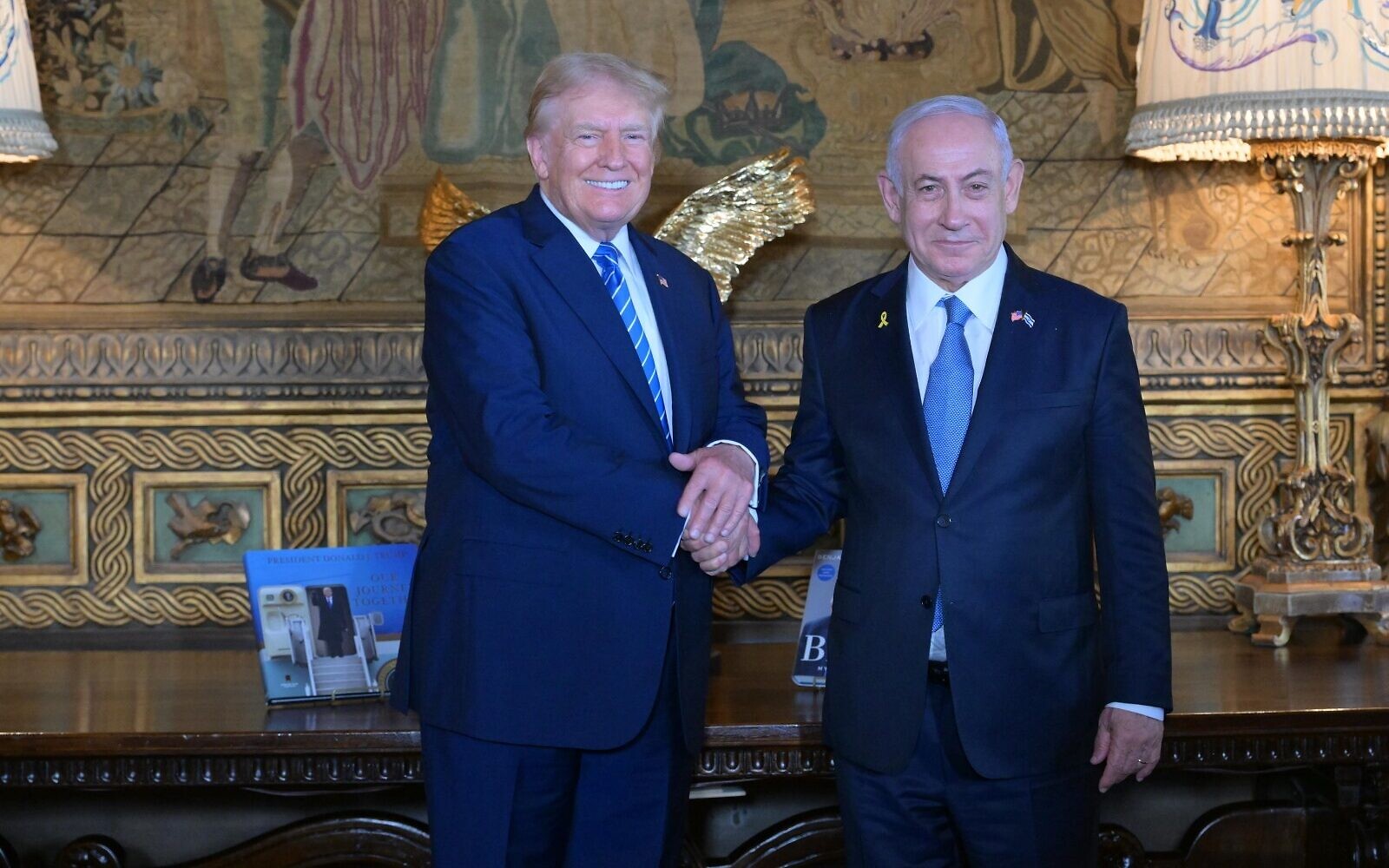
Former US president Donald Trump (left) hosts Prime Minister Benjamin Netanyahu at his Mar-a-Lago resort, Florida, July 26, 2024. (Amos Ben Gershom/GPO)
It is by no means certain Trump will give backing to a move that puts at risk Washington’s strategic ambition of a wider deal under the Abraham Accords to normalize Israel’s ties with Saudi Arabia, which, like most countries in the world, rejects Israeli sovereignty in the West Bank.
“Trump’s desire for expansion of the Abraham Accords will be a top priority,” said Dennis Ross, a former Middle East negotiator for Democratic and Republican administrations, based on his own assessment of Trump’s foreign policy considerations.
“There’s no way the Saudis will think seriously about joining if Israel formally absorbs the West Bank,” he said.
Annexation would bury hopes of a two-state solution that creates an independent Palestine and also complicate efforts to resolve more than a year of war in Gaza that has spilled over into neighboring Lebanon amid Hezbollah’s attacks on Israel.
In his first term, Trump moved the US embassy in Israel to Jerusalem and ended Washington’s long-held position that the settlements are illegal. But, in 2020, his plan to create a rump of a Palestinian state along existing boundaries derailed efforts by Netanyahu for Israeli sovereignty over the area.
The president-elect has not revealed his plans for the region. Trump transition spokeswoman Karoline Leavitt did not answer questions about policy, saying only that he would “restore peace through strength around the world.”
Nonetheless, Israeli Finance Minister Bezalel Smotrich, one of the most prominent pro-settler ministers in the government, said last week he hoped Israel could absorb the West Bank as early as next year with the support of the Trump administration.
Israel Ganz, the head of the Yesha Council, an umbrella group of West Bank Jewish municipalities, said in an interview that he hoped the Trump administration would “let” Israel’s government move ahead.

Yesha Council chairman Israel Ganz celebrates Donald Trump’s victory in the US presidential election by launching a new Trump wine label at the Psagot West Bank winery, November 6, 2024. (Courtesy: Psagot)
Ganz led a prayer session for a Trump victory in the ruins of an old Byzantine basilica in Shiloh before the Nov. 5 election.
“We prayed that God will lead to better days for the people of the United States of America and for Israel,” he said. Shiloh has been a popular stop for visiting US politicians, including both Huckabee and Pete Hegseth, Trump’s nominee for Secretary of Defense.
Last week, Huckabee told Arutz Sheva, a news outlet aligned with Smotrich’s Religious Zionism movement, that any decision on annexation would be a matter for the Israeli government. Huckabee did not immediately respond to a request for comment.
Senior Palestine Liberation Organization official Wasel Abu Yousef said any such action by the Israeli government “will not change the truth that this is Palestinian land.”

Mike Huckabee gestures at a campaign event at the Drexelbrook Catering & Event Center, October 29, 2024, in Drexel Hill, Pennsylvania. (AP/Julia Demaree Nikhinson)
Surrounded
Together with the neighboring settlement of Eli, Shiloh sits near the center of the West Bank, an hour from Jerusalem along Route 60, a smooth motorway that contrasts sharply with the potholed roads that connect the area’s Palestinian cities.
Bashar al-Qaryouti, a Palestinian activist from the nearby village of Qaryut, said the expansion of Shiloh and Eli had left Palestinian villages in the central West Bank surrounded.
Al-Qaryouti described an increase in settlers constructing without waiting for formal paperwork from the Israeli government, a trend also noted by Peace Now, an Israeli activist group that tracks settlement issues.

Palestinian demonstrators move away from Israeli tear gas while protesting what tey said were attempts by Israeli settlers from Eli to take control of a water spring in the village of Qaryut, south of Nablus in the West Bank, on June 24, 2022. (JAAFAR ASHTIYEH / AFP)
“This is happening on the ground,” Al-Qaryouti told Reuters by phone. “Areas across the center of the West Bank are under the control of settlers now.”
The West Bank, which many in Israel call Judea and Samaria after the old Biblical terms for the area, is a kidney-shaped region about 100 km (60 miles) long and 50 km (30 miles) wide that has been at the heart of the Israeli-Palestinian conflict since it was captured by Israel in the 1967 Six Day War.
Most countries consider the area occupied territory and deem the settlements illegal under international law, a position upheld by the UN’s top court in July. Israel argues the area is contested.
Around 750,000 Palestinians were displaced with the creation of Israel in 1948, according to UN estimates. The West Bank is claimed by Palestinians as the nucleus of a future independent state, along with the Mediterranean enclave of Gaza to the south.
But the spread of Jewish settlements, which have mushroomed across the West Bank since the Oslo interim peace accords 30 years ago, has transformed the area.
Revered as the site of the tabernacle set up by the ancient Israelites after they returned from exile in Egypt and kept there for 300 years, modern Shiloh was established in the 1970s and has the air of a gated community of quiet streets and neat suburban homes. Its population in 2022 was around 5,000 people.
For supporters of Jewish settlements, the historical connection is what gives them the right to be there, whatever international law may say.
“Even if the Byzantines, the Romans, the Mameluks and Ottomans ruled it, it was our land,” said Medad.

New York-born Yisrael Medad, 77, a resident of the West Bank settlement of Shiloh, talks during an interview at his home, on October 30, 2024. (Sharon Aronowicz / AFP)
As such, settler advocates reject the term “annexation,” which they say suggests taking a foreign territory.
Settlement construction in the West Bank reached record levels in 2023. Since the war started in Gaza last October, a spate of new roads and ground works have changed the appearance of hillsides across the area visibly.
Criticism from the Biden administration has done nothing to stop it.
At the same time, violence by Jewish settlers against Palestinians in the West Bank has spiraled, including around Shiloh, drawing international condemnation and US and European sanctions, as recently as this week, against individuals deemed to have taken a prominent part.

People check burnt vehicles at the site of a reported attack by Israeli settlers in the West Bank city of Al-Bireh, on November 4, 2024. (Zain JAAFAR / AFP)
Settler leaders including Ganz say violence has no place in their movement. The settler movement has argued that they provide security for the rest of Israel with their presence in areas near Palestinian towns and cities, bearing the brunt of terror attacks they argue would be aimed at the country’s heartland if they were not there.
“Irreversible fact”
A series of steps have been taken to consolidate Israel’s position in the West Bank since Netanyahu’s current government came to power with a coalition agreement stating that “The Jewish people have a natural right to the Land of Israel.”
“We’re changing a lot of things on the ground to make it a fact that Israel is in Judea and Samaria as well,” said MK Ohad Tal, chairman of Smotrich’s parliamentary faction, speaking from his Knesset office, a red Trump MAGA hat on a nearby shelf.
A whole mechanism has been built “to effectively apply sovereignty in Judea and Samaria, to make it an irreversible fact that Jewish presence is there and to stay.”
Many functions relating to settlements previously handled by the military have been handed to the Settlement Administration, a civilian body answerable directly to Smotrich, who has an additional Defense Ministry portfolio that puts him in charge of West Bank civil affairs.

Illustrative: Finance Minister Bezalel Smotrich attends a Finance Committee meeting at the Knesset, on September 16, 2024. (Yonatan Sindel/Flash90)
In 2024, nearly 6,000 acres (2,400 hectares) have been declared Israeli state land, a classification that makes it easier to build settlements — the biggest annual growth on record and accounting for half of all areas declared state land in the past three decades, Peace Now said in a report in October.
At least 43 new settler outposts have been established over the past year, compared with an average of under 7 a year since 1996, according to a separate analysis from Peace Now.

An aerial photo taken on February 3, 2023 shows the Givat Harel Israeli outpost, near the settlement of Shiloh, in the West Bank north of Ramallah. (MENAHEM KAHANA / AFP)
The outposts, often satellites of existing settlements on nearby hilltops that allow the original location to expand, have been served with kilometers of new roads and other infrastructure. Often built illegally according to Israeli law, the Yesha Council has said almost 70 were extended government support this year.
“It’s clever because it’s boring looking,” said Ziv Stahl, a director of Yesh Din, another Israeli group that tracks settlements. “They are not legislating now, saying ‘We are annexing the West Bank’ — they are just doing it.”














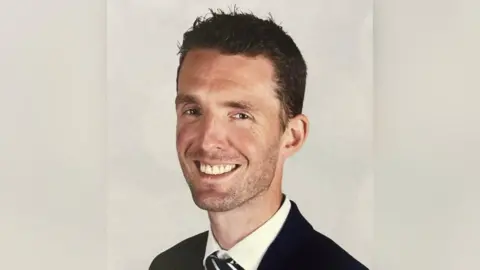

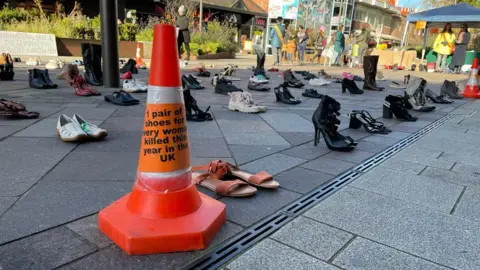
 BBC
BBC